Back on the Soapbox: Interviews with KCPR Alumni
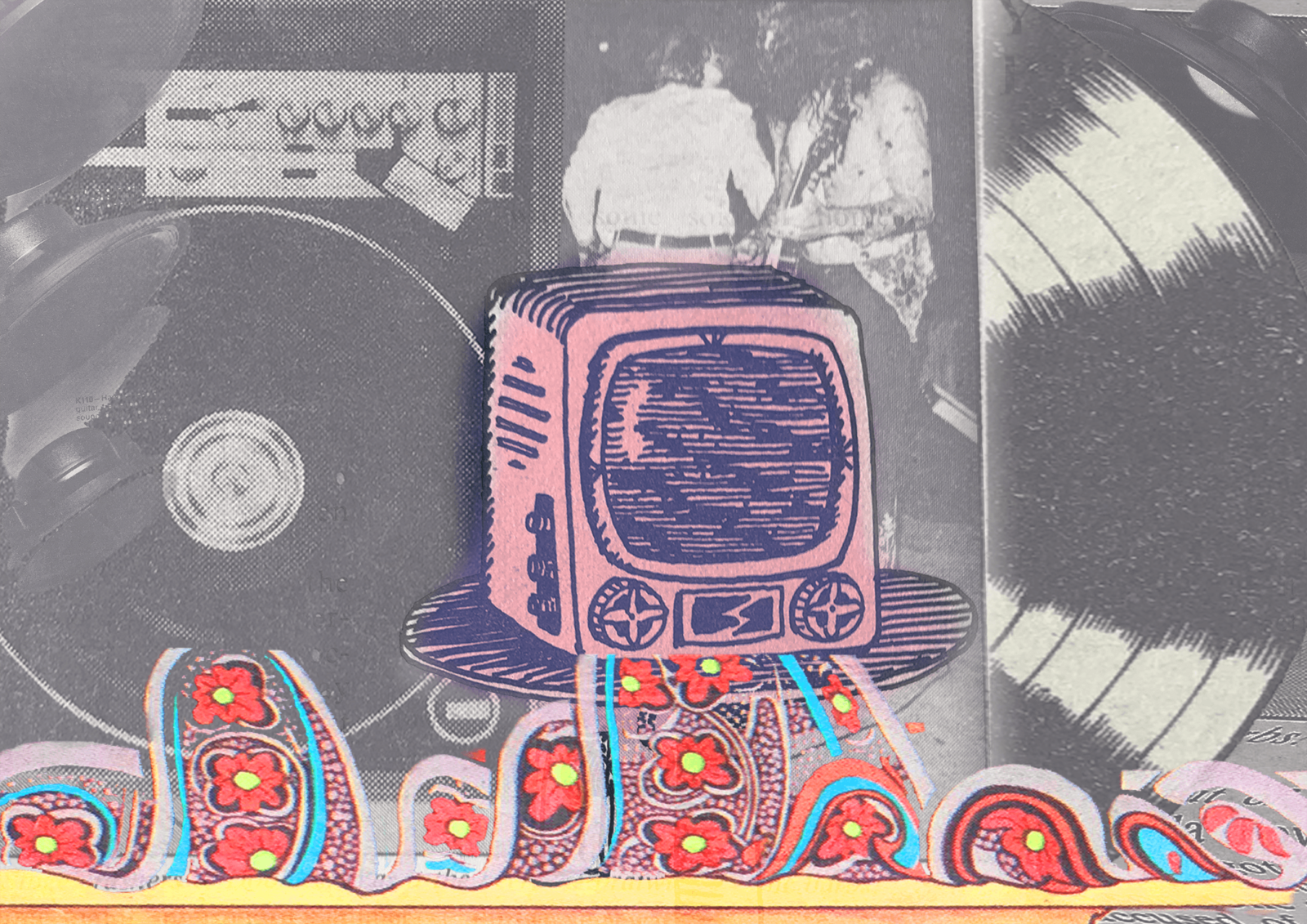
The station has come a long way since 1968, when Alan Holmes and Jim Stueck stuck an audio console and some turntables on the second floor of the Graphic Arts building and stated the infamous first words ever heard on KCPR — “How the hell do you turn this thing on?”
Generations of music geeks and art junkies since—all of them eccentrics in one way or another—have built Cal Poly radio into the motley of misfits it is today.
In honor of this hodgepodge, we contacted some those misfits, who are now out in the real world doing real adult things, and had them give us some advice on how to make the most of being different.
The following contains a smattering of words from our past alumni, who lovingly spared some quotes about how they got involved in the station, some songs—or “quarantunes” (a term coined by the lovely Phoebe Townsend)—that have been getting them through lockdown, and how their time in the station has helped shape the rest of their lives.
(KCPR is also currently accepting donations so that we can keep our voices floating over the radio-waves. Feel free to pitch in here if you’d like to send some love to student-run public radio).
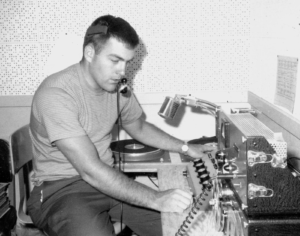
Jakob Mcquade
Artist Relations at Ernie Ball
Journalism, Graduated in 2020
Quarantune Album: Playing Piano for Dad by h hunt
DJ Name: MC Quade (briefly Party Dog)
What made you want to get involved with KCPR?
Before I committed to Cal Poly, I came up to visit with my mom, and she told me as we were approaching, “I’m pretty sure that Cal Poly has a really cool college radio station. We should listen to it.” So we turned on the station and they were playing “Age of Consent” by New Order. I was instantly hyped. After the song ended, the DJ who was on there at the time, who I still have yet to locate, was like, “That last song was ‘Age of Consent’ by New Order and was actually a request from my mom. So thanks mom for listening, that one goes out to you.”
I was sitting there in the car with my mom and I was like, “Okay. That’s destiny.” That ended up being the first song that I played on my first show ever and the first song that I played on my last show ever.
How did KCPR influence or how does it continue to affect success in your career? In other words, what greater purpose did KCPR serve you?
After a couple months of being at KCPR, I started to ask myself “what if I could do this for the rest of my life?” I never even considered the music industry as something that you could do after college. They don’t really tell you about that in high school, and I didn’t know anyone in the music industry, so being in KCPR opened my eyes to that possibility.
When it comes to Ernie Ball, a little bit more specifically, I wouldn’t have been “in the right place at the right time” to get the opportunity for the job if it weren’t for KCPR. While I was at ShaBang in 2019, covering the festival for our website, I saw the Ernie Ball booth. I didn’t even know Ernie Ball was in SLO so I walked up to the booth, and the guy that was there saw my press pass for KCPR and asked me what I did. I ended up talking to him and finding out he was the Artist Relations person for Ernie Ball. We exchanged numbers, shot the sh–t, and became business acquaintances.
What is a word of advice for students looking to pursue careers in the music industry?
There are a bunch of different ways you can get into the things that you like, so spend the time in the station. Like, there are people that I know in SLO who are starting pirate radio on an AM wavelength, like that’s f—ing badass! If you don’t get into KCPR, go start something new, be on pirate radio and don’t have rules. You can say f–k, like, that is crazy!
Everyone has said this a billion times over, but failing is what you have to do in order to learn. If you can’t take that mistake or take that failed project and look at it and be like, “hey, this sucks, I don’t like it. But this is what I learned” you will look back on those mistakes and be like, “Damn. Without those I couldn’t have done this whole thing.”
KCPR started because two kids were in their dorm room and they wanted to start a radio station. Look at the massive effect, the domino effect, the butterfly effect, whatever you want to call it, that has trickled down into our lives. Anyone who’s looking at their life is like, “they didn’t have to get into an organization. They didn’t get turned down by it. They started their own thing because they had to.”
So that’s my advice.
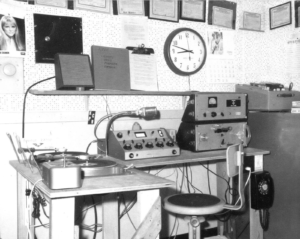
Everett Fitzpatrick
Freelance Photographer
Art and Design
Quarantune: “Time Away” by Arthur Russel
DJ Name: Lanky Limbs
How would you describe your show?
It was a stew of spontaneous proclamations, one Velvet Underground song and around 29 other tunes.
How has KCPR impacted you since graduating?
KCPR was kind of like having a middle ground with all things different—at Cal Poly, it’s not like a regular art school, you know, we have so many different fields of study and there’s a wide gamut of beliefs and it’s a big group of people that you wouldn’t have interacted with if I just went to a regular art school. So KCPR was kind of like, for me, the bridge into having discussions with these people. Everyone has a story, and KCPR really opened me up to talking to people and going out on a limb.
I now work with a company started by my friend, and we work with some of the major promoters in the Los Angeles area. We’re making really cool shit, you know. Without KCPR, I probably wouldn’t have pushed to kind of abandon my schoolwork. You know, my last quarter of college, I worked six of the 10 weekends at music festivals. I turned in the base level of work because I knew the grades that I was going to get on a project didn’t matter in the shadow of doing real life things, and KCPR really pushed me to do real things, you know.
An essay on the portrait of Dorian Gray didn’t prepare me to do the work and be freelance in LA like I am right now. So taking chances at all costs, trying to make things work, even if you sacrifice other things. These are all things that I learned from KCPR.
What tools did KCPR supply you for the real world, outside of college?
KCPR, as a learning laboratory, has propelled me and all my friends to chase down ideas in which the normal institution of Cal Poly probably would have thought we’re unnecessary. You know, we dedicated hours upon hours to research musicians that we are passionate about. Not necessarily for any reason. We were just interested. And I think that’s the most valuable thing that I’ve taken from college.
Even if there isn’t a finite reason why you’re doing something, if it feels right, just do it. Because you’re not going to lose anything from trying, and, whatever you gain, even if it’s just failure, you’ve learned something. So through KCPR I was challenged to push myself and try things in which I probably wouldn’t have been pushed to do in the classroom.
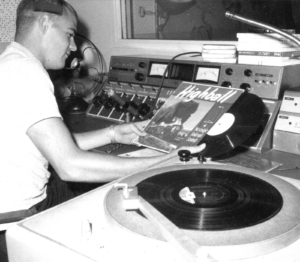
Parker Glenn
United Talent Agency
Music Business with a focus in Entrepreneurship, graduated in 2015
Quarantune: “Do My Thing” by Erika de Casier
DJ Name: DJ Parker
How did KCPR influence or how does it continue to affect success in your career?
I think that KCPR opened up a lot of doors for me and also helped push me into the live space. Like taking [my] first events job. I knew I loved that stuff, and I was already doing it, but I didn’t really have a path and [KCPR] helped.
I definitely credit KCPR with many of the concert and event opportunities I’ve gotten. In my senior year, I remember I just picked up and went to South by Southwest—I had a friend who had an internship at some label and was like, “Hey, you can help run our barbecue?” Did that, met people there. I ended up running around Austin, going to check out these different venues, just like I did back when I was at the station.
We also had CMJ, which was just a radio conference in New York, and I went there fall of my senior year. I think we paid for everything on our own too out of our own pockets. But we had like a blast and met a bunch of people—people I still talk to, or that were in radio that have gone on to do other things. I just had so many just experiences and exposure that I think just make it so incredible. But yeah, I think I owe a lot to the station in terms of the impact it’s had on my career trajectory for sure.
What is a final word of advice for students looking to pursue careers in the music industry?
Don’t stay in San Luis Obispo. That’s not a knock on the city. It’s an exposure thing. I wish someone told me, like “Hey, pick up your life one summer and go down to LA and feel it out.”… The industry lives predominantly in LA and a bit in New York, so the internship access that schools like USC have in this market is incredible. It’s not to say that Cal Poly students don’t have a place, they just have to try that much harder to get there. So I would say the summer before your junior year is a must-do internship summer, I can’t recommend it enough. Get out there and try to figure out a way to live there for the summer, in New York or in LA.
It’s just about getting out there…because then you’re going to be that much further ahead when you’re coming into the summer before your senior year. And you can have a real opportunity to grow your network so that when you graduate, you feel like you’ve met people, you feel like you’ve seen enough, and you can feel confident about what you want to do.
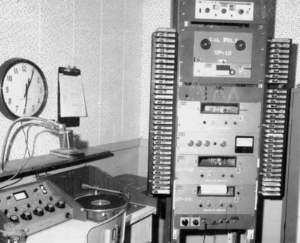
Stacey Anderson
Senior Editor at Pitchfork
Journalism with a Music minor, graduated 2006
Quarantune: “you should call me mum” by Little Simz
DJ Name: DJ Monster Truck
How would you describe your show?
It was a special format show, called “Better Before you were Born”.
It was a look back at [the show’s week] in Rock and Pop history. We’d go back into the archives and see like, “Oh, this was the week in 1960-something where Bob Dylan crashed his motorcycle” and talk a little bit about that history before we played a song. I had all these really elaborate notes. And it would really speak to the budding historical music nerd that I would soon realize I was. It’s actually kind of funny because years later I would be a freelancer for Rolling Stone. I would end up writing a column on the website under the exact same product and I would go to my KCPR notes, which is major, to flights in New York, and I would reference that and just write the column over again.
What made you want to get involved with KCPR?
On my tour at Cal Poly, I heard the most intensely atonal like, scathing punk music coming from this weird little doorway down the hall, and I was just magnetized by it. I went to the door and I started just borderline assaultively talking at the DJ who was on air.
I was so enamored by this creepy space, with walls papered with flyers and pictures and a shoddy red couch that was surely just a biohazard. It was exactly what I had imagined a college environment to be. I was so in love with it instantly. I spent so long at the studio that my parents had to come looking for me, and they didn’t find me for about an hour.
By the time they found me I said, “I’m going to Cal Poly.”
How has KCPR impacted you since graduating?
I think it’s hard to pinpoint one thing, but I certainly learned the beauty and discovery of following different pathways of interest that culturally revealed themselves to me at KCPR. I mean, I certainly appreciate the fact that I had a formal journalism degree, but it did not help me get the career I have now anywhere near the impact that KCPR had, because that’s where I learned what I loved musically and what I disliked.
It also introduced me to people who were free spirited and passionate and curious. By being around them and wanting to be more like them, I became more of the person that I wanted to be as well. They’re my family. And we just had such a wonderful time. But also, I think that that’s where I really learned to foster an independence of opinion that maybe I didn’t have before in my life. It was a very welcoming space to be contrarian, which helps you in your music critique.
What is a word of advice for students looking to pursue careers in the music industry?
Whenever possible, work at the place where you’re thrilled to be the lowest in the food chain. Work with colleagues you hope to learn from, whose skills intimidate you. In hindsight, from internships on through my current role at Pitchfork, I’ve worked where I was most eager to learn, at places with the editorial tones I most admired—sometimes turning down higher titles or larger paychecks in the process—and that has been a far better investment.
Also, even though creative industries are not concentrated entirely in big cities anymore, thanks to the internet, don’t discount how important social scenes are: a lot of opportunities and jobs come from the referrals of people you know, even casually. So enjoy meeting people in your creative community, be kind and try to help them along, and it’ll come back to you abundantly. That’s the fun part, anyway—meeting your creative tribe!
Lastly, when you do get a job in your industry, always look for a way to sharpen the other skills you’re not building in that role. For example: You’ve been hired at a major site to write record reviews? Great! Enjoy that for a while, then start pitching profiles, too. If you can’t write them there, find a smaller site you can freelance them for, even though it’s probably for less money. Always keep adding to your roster of skills, even outside your main job; when another job comes along, you want to show you have the skills (and clips) for it already.
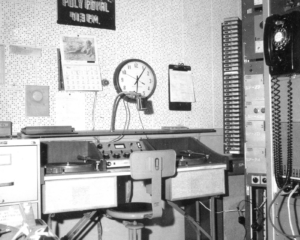
Layla Parvis
Creative Artists Agency
Music, Graduated 2015
Quarantune album: Ugh, those feels again by Snoh Aalegra—she’s like the first artist that I feel like I connect to because she’s Persian and I’m Persian. And there’s not that many people in that space. Like within my culture. So I just feel like I really relate to her.
Dj Name: DJ LP
Primarily played rock, r&b, hip hop and alternative
How did KCPR influence or how does it continue to affect success in your career?
I think I fully am where I am because of KCPR—like 100%—because I formed a relationship with Bruce Flohr. When he came to speak, actually, we developed a relationship. And then he told me to apply to Red Light for a summer intern program. And that’s when I started really getting into it. I always knew I wanted to work in the industry, but after interning at Red Light, I really understood how everything works. Before that I didn’t know the difference between a manager, an agent, a publicist, or a social media manager. I didn’t know what any of those things were, and working there really taught me the difference.
Developing a relationship with Bruce and meeting people at Red Light kind of gave me an introduction into networking in the industry. So after I graduated, he helped me a lot and connected me with people that ultimately led me to interview at CAA. So I basically attribute getting my job to KCPR because I wouldn’t have even been in the position I am today.
What is a final word of advice for students looking to pursue careers in the music industry?
I would say like, take advantage of everything KCPR has to offer learning-wise and feel free to reach out to alumni who work in the industry. Ask questions and make connections because I think that a lot of the times, we don’t think to use our resources. For example, if someone were to message me on LinkedIn from Cal Poly and they were on KCPR and they wanted to learn more, I would be more than happy to hop on the phone with them.
So I guess that’s the best advice. Just use your resources and reach out to people who you have connections with, even if it seems small or feels awkward to reach out. Even if you don’t know them I’m sure they’d be happy to help you. The station is really close at the end of the day.
Malik Miko
Satellite of Love, Professional DJ
Political Science
DJ Name: DJ Malik
Quarantunes: Any Instagram livestream sets, especially the ones that Quest Love is doing.
How would you describe your show?
Eclectic. As a college radio DJ your ears are wide open. So my sound was pretty much anything I was into at the time really. Your taste changes as you change.
What made you want to get involved with KCPR?
I think, you know, I would always sit through a whole movie and wait to the end just to see the credits, listen to the prevailing songs. Even as a kid like I went through just different phases of absorbing music. My grandparents lived in Philly, so I was into like, a lot of hip hop as a kid, just discovering it there from the radio stations. And in high school, I discovered college radio stations up in Stanford. And I discovered like, you know, that the left hand side of the dial had all the interesting shows. You know, I kind of listen to everything—Adult Contemporary, oldies, or underground hip hop—anything. Me and my friend were RAs at the time, saw the advert, started listening and was like this could be really fun. We went out and tried for it and got accepted.
How did KCPR influence or how does it continue to affect success in your career?
Having a chance, especially over summertime, to do shows and explore your own like interests. You could craft a special program around something that you were just kind of interested in and lo and behold ‘boom!’ you have a show. Now you have to fill it. And so you had to go explore and dig and find stuff and learn, and I think that just gave me the motivation to seek out new things. So you’re able to spur your own growth of what you like, what you listen to, and discover.
What’s one of your biggest takeaways from being a part of KCPR?
The one thing that made me feel at home was that we had such a diverse crowd, but everyone was there for the music. Like every now and then you had like a party and suddenly you were hanging out with the Ska kid. Then the Death Metal kid was there and the goth kids and the hip hop guys and the twee person—everyone was there.
Usually these are crowds that don’t really interact. Most people kind of stay to their own group. Suddenly, this was just everyone was hanging out. It was a very open, friendly environment. Like I didn’t really understand death metal until death metal guy just kind of explained some of it to me. He had me listen to just the drummer and I remember realizing, “wow that guy is really drumming 180 beats a minute, just non stop. That’s really impressive.” So you get to see things a little differently. And yeah, it was nice being around different people who felt relaxed around one another.
I think that alone, you know, it was just very open. I think so much in life you get together with people and you’re in a crowd that makes fun of something that’s different than your crowd. That’s kind of the go-to for people. And I think at KCPR, there was just acceptance, so I think that has probably the biggest effect.
What is a final word of advice for students looking to pursue careers in the music industry?
Think you just have to be into it. And it’s hard to say. Everything moves so fast—between working campaigns and DJing, you know. I think from a producer side, you probably have way more visibility now than prior. Just by hustling you can get yourself out there, you can make beats, you can do a lot of stuff at home on a laptop.
I think KCPR allows people who want to gather artists and create a label an easy way to do it really quickly. It’s just, you know, it’s about feeling it, and KCPR will always get people together who are interested in music. Having that connection to other people, whether you do it alone or you have friends is just nice. It’s nice to just to be around that energy.
If you still want to know more about what we do, feel free to check out this lovely KCPR tour (recorded in 1977).
Delaney Faherty is a Cal Poly City and Regional Planning junior and KCPR’s Interview Coordinator. She wrote the article with KCPR’s Editor-In-Chief Ethan Hundertmark, and conducted the interviews with the help of Jaxon Silva, Cal Poly Engineering freshman and KCPR staff member.
Olive Robertson is a Cal Poly Graphic Communications sophomore. She created the illustration. Image credits to Alan Holmes.

